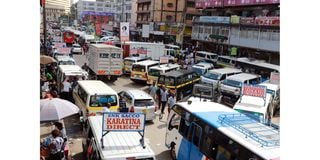Covid-19: Crackdown on PSVs, passengers planned for today

Public service vehicles along Accra Road in Nairobi in March 2020.
A crackdown on crew of public service vehicles and passengers flouting rules to curb the spread of Covid-19 is planned today, even as a spot check by the Nation around matatu termini exposed violations.
Dr Josephine Kibaru Mbae, the director of health at the Nairobi Metropolitan Services (NMS), said the measures have not been effective.
She blamed Kenyans for not complying with the directives and warned enforcement is not negotiable.
“We have been talking and they are not changing, we have now decided to start arresting them,” Dr Mbae said.
A spot check by the Nation of about 30 matatu terminals revealed overcrowding as Kenyans queue to get home especially during rush hours.
Even inside the matatus there is zero social distancing and blatant disregard of face-masks.
“At Odeon if people social distance there will be no space for them to line up,” Nahashon Karanja, a bus conductor told the Nation.
Directives issued
In March 2020, Transport PS Charles Hinga issued directives aimed at reducing the spread of COVID-19 through the public transport system. According to the directives, all motor vehicles and equipment should be cleaned, disinfected, and sanitized after every trip.
In addition, all public service operators are to provide sanitizers for passengers before boarding vehicles. This has not been put into effect at all.
“Our health function was transferred to NMS and it is unfortunate they haven’t been doing much,” Ben Mulwa, Nairobi Governor Mike Sonko’s spokesperson, told the Nation.
According to June 2020 a report by Professor Evaristus M. Irandu at the University of Nairobi, UON, about 42 percent of daily commuters walk, 48 percent ride amatatu, 5 percent commute by private car, and the remaining 5 percent use other modes.
The study also estimates that during morning peak in Nairobi, the average vehicular speed is about 8.3 km/hour and 7.6 km/hour during the evening peak. This shows that commuters in congested matatus and buses may be easily exposed to risk of infection in case one of the commuters has the virus.
Wear masks
The Ministry of Health directed PSV operators to wear masks and not to allow any passenger to board without one. They are also required to observe social distancing as they ferry passengers by allowing only 60 percent of the capacity of their vehicles. This means that 14-seater vehicles should carry eight passengers per trip. All these instructions have fallen on deaf ears thus endangering many lives.
“There is an issue around enforcing all these things because it is a multiagency effort,” Dr Kibaru revealed to the Nation. She also confirmed that those who have been tasked in the past to move around enforcing the law have not been doing it.
“The sub –counties have not been not effective which is why we are forming a team by Friday to act accordingly.”
She also revealed to the Nation that NMS is working towards having Matatu terminals outside the City by next month. “Thika matatus will be stopping somewhere in Kasarani.”
The Nation also established that options will be in place to get passengers to town.
“There is no water for hand-washing or even soap in most of the matatu terminals,” says Rose Wanjiku, 40, a trader in Ngara.
To children
According to her, after hustling for an entire day all she thinks about is getting to her five children.
“You don’t think about overcrowding in the bus and Covid-19 but what you will cook for them.”
Simon Kimutai, the chairperson of Matatu Owners Association, argues that passengers have also been careless and equally share in the blame.
“Nobody can force you to enter a crowded matatu.”





